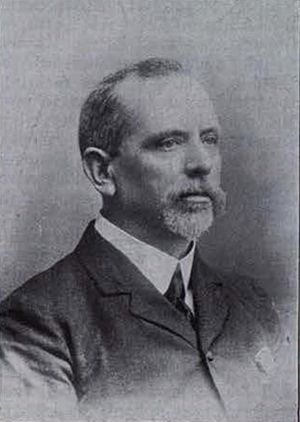Alexander Pedler facts for kids
Sir Alexander Pedler (born May 21, 1849 – died May 13, 1918) was an important British scientist and government worker. He was a chemist who taught at the Presidency College in Calcutta, India. He helped many early Indian scientists, like Prafulla Chandra Ray, learn about chemistry. Sir Alexander also helped start the Indian Association for the Cultivation of Science. This group aimed to share science with everyday people who were interested in science.
Contents
Early Life and Education
Alexander Pedler was born on May 21, 1849. His father, George Stanbury Pedler, was a pharmacist, which means he prepared and sold medicines. Alexander went to school privately and then attended the City of London School.
In 1866, he began studying at a special laboratory of the Pharmaceutical Society of Great Britain. He then worked as a chemistry assistant at the Royal Institution. There, he learned from well-known scientists such as Herbert McLeod, Edward Frankland, and Norman Lockyer.
Scientific Discoveries and Work
In 1868, Pedler worked with Norman Lockyer in Sicily. They were studying the light from the sun when Lockyer made an exciting discovery: he found helium on Earth! Pedler also worked with Edward Frankland to study different forms of a chemical called valeric acid.
In 1869, Pedler visited America. When he returned, he became a chemical examiner at the Royal College of Chemistry. He became a Fellow of the Chemical Society in 1870, which is a recognition for chemists.
Contributions in India
When he was 24, Pedler moved to India. He became a professor of chemistry at Presidency College in Calcutta. This college was connected to the University of Calcutta. His chemistry lectures were very popular and inspired many students, including Prafulla Chandra Ray, who became a famous Indian chemist.
Pedler also helped start the Indian Association for the Cultivation of Science. This group was created to share scientific knowledge with people who were not professional scientists. He also gave talks at the Asiatic Society.
Sir Alexander Pedler used his chemistry skills to solve problems in India. For example, he studied:
- The poisons found in cobra venom.
- How lead linings in tea storage chests would rust.
- The quality of Calcutta's water supply.
- The properties of coal gas.
He served as the principal of Presidency College several times. In 1901, he became the Director of Public Instruction in Bengal, which meant he was in charge of education in that region. He received an honor called the Companion of the Order of the Indian Empire (CIE) in November 1901.
Later Life and Legacy
Sir Alexander Pedler was knighted in 1906, shortly after he retired. This meant he was given the title "Sir." He then moved to London.
In 1907, he helped Norman Lockyer establish the British Science Guild. This group aimed to promote science in Britain. Pedler served as its honorary secretary.
Pedler was elected a Fellow of the Royal Society in 1892. This is a very high honor for scientists. He passed away suddenly on May 13, 1918, while attending a meeting.
To remember his important work, the British Association holds an annual lecture called the Alexander Pedler Lecture.


